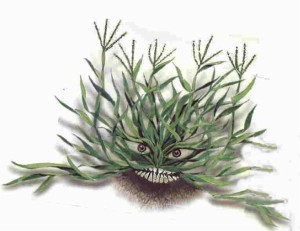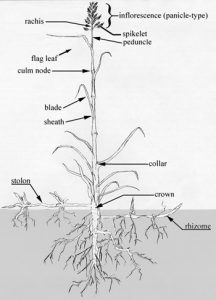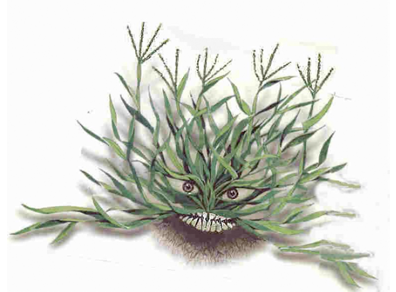Death to Bermuda Grass
 ZOMBIES – I am a fan of Zombie movies and tv shows. I have seen them all from “Dawn of the Dead” to “The Walking Dead”. The common theme in all Zombie movies is that the dead rise again and torment the living. Unfortunately, Bermuda grass is the Zombie of all grasses. It just keeps coming back and unlike ‘real’ zombies you can’t cut off the head and win. Bermuda grass just keeps coming back. One of the most common things we hear at ClassicLawns from customers is that they hate Bermuda grass and they want it gone! DEATH TO BERMUDA is a the battle cry. Bermuda grass is a major nuisance and most people hate it! Compared to fescue and bluegrass it is ugly, course and pale green. It grows everywhere and invades your beautiful grass and your landscape beds.
ZOMBIES – I am a fan of Zombie movies and tv shows. I have seen them all from “Dawn of the Dead” to “The Walking Dead”. The common theme in all Zombie movies is that the dead rise again and torment the living. Unfortunately, Bermuda grass is the Zombie of all grasses. It just keeps coming back and unlike ‘real’ zombies you can’t cut off the head and win. Bermuda grass just keeps coming back. One of the most common things we hear at ClassicLawns from customers is that they hate Bermuda grass and they want it gone! DEATH TO BERMUDA is a the battle cry. Bermuda grass is a major nuisance and most people hate it! Compared to fescue and bluegrass it is ugly, course and pale green. It grows everywhere and invades your beautiful grass and your landscape beds.
So, how can you get rid of Bermuda grass you ask? I wish I could be a hero and be a Zombie slayer like Woody Harrelson in Zombieland or Darrel in The Walking Dead, but unfortunately the short answer is you can’t. At least not in Springfield, MO. Yes, there are a few products out there that claim to kill Bermuda without hurting your good grass. Don’t waste your time or money. You most likely are just going to make it worse. More on that later.
Five years ago I would have told you that I had a plan to get rid of Bermuda grass from your lawn. We would treat the entire lawn multiple times with Round Up over a 6 week period in late July thorough August. Of course, this would kill off your good grass too and you would have to reseed. This used to work. Sort of. Kind of. Not really. A year later I would see Bermuda grass returning. The homeowner usually saw it the second year. By the third year after killing off the whole lawn and reseeding, there was just as much if not more Bermuda in the lawn. This was upsetting for us and infuriating for the homeowner. A waste of time and money! Again you ask, “So, how can you get rid of Bermuda grass?”
TECHNICAL STUFF – In the next few paragraphs I will get all technical and explain why it is so hard to kill Bermuda. If you don’t want technical mumbo jumbo, skip ahead.. Bermuda is a warm season grass. It has a very extensive root system. Legend has it grave diggers have found Bermuda roots 5 feet down. True? Maybe, but even if not the root system grows DEEP! Plus, Bermuda grass has stolon’s and rhizomes (See Plant Diagram Image). You are familiar with stolons. A lot of folks call them runners. They spread the Bermuda out across your lawn and beds above ground. Bermuda also has rhizomes. Same thing as stolons just below ground. This is why Bermuda spreads so aggressively. The rhizomes AND the stolons are working overtime creating more Bermuda babies to take over any competition. For reference, bluegrass only has rhizomes. Fescue has neither rhizomes or stolons.
warm season grass. It has a very extensive root system. Legend has it grave diggers have found Bermuda roots 5 feet down. True? Maybe, but even if not the root system grows DEEP! Plus, Bermuda grass has stolon’s and rhizomes (See Plant Diagram Image). You are familiar with stolons. A lot of folks call them runners. They spread the Bermuda out across your lawn and beds above ground. Bermuda also has rhizomes. Same thing as stolons just below ground. This is why Bermuda spreads so aggressively. The rhizomes AND the stolons are working overtime creating more Bermuda babies to take over any competition. For reference, bluegrass only has rhizomes. Fescue has neither rhizomes or stolons.
So you say, “I have sprayed Round Up on the Bermuda and it killed it. Why did it come back?” The answer is that you didn’t kill all of it. You only killed a part of the Bermuda. How? Well, you first must understand how Round Up works. Round Up works by being absorbed into the plant and disrupting a process inside the plant causing death. For Round Up to work it has to touch a green part of the plant. Once Round Up hits the ground or anything non-green, it becomes inert and quits working. The leave, or green part, of the plant is what absorbs the Round Up. Once the product is absorbed, it translocates the Round Up through the plant. For most grasses this will result in death, but here is where the zombie part kicks in. Bermuda’s deep roots and its extensive rhizomes and stolons network prevents the Round Up from translocating all the way through the plant to kill it. Parts of the stolons, rhizomes , and/or roots survives. Ok you say, spray it again! Super let’s do just that. The problem is that now all the leaf tissue of the Bermuda is now dead from the first treatment. It can’t absorb the Round Up and the Round Up touches the ground and becomes inert. Round UP CANNOT move through the soil! So, without any green leaf tissue for the Round Up to hit it is worthless. You have just wasted more time and money.
BAD TO WORSE – Whether you try to kill Bermuda with Round Up or one of the other many products that claim to knock out this Zombie grass, you have failed. Not all of the Bermuda dies. The stolons, rhizomes, or roots that have survived now get MAD! I know. Bermuda does not have emotions. It can’t get mad. Ok sure, but the remaining parts of the plant have now been thrown into the ultimate Bear Grylls survival mode. You have killed out the leaf tissue. The factory of the plant. It’s way to make food. You know all that stuff we kind of learned in high school biology. Photosynthesis, chlorophyl, plants, blah, blah, blah. So, the surviving parts of the Bermuda go into super overtime to make new leaf tissue so it can survive. Now instead of killing off your arch enemy you have made things even worse. God may have said, “Vengeance is mine”, but Bermuda says, “God knows nothing of vengeance. Just watch me now!” It will now take over more of your lawn than before. Plus, don’t forget! When you applied Round Up you killed off your good grass. Now there is no competition for the super mad and aggressive Bermuda. This is why trying to kill it off is futile.
BUGS BUNNY CARTOONS – “Great! Thanks for all the bad news,” you say. So, what can be done. We have all seen the Bugs Bunny cartoons where no matter how hard his adversary tries to get him. They just can’t win. They inevitably end up saying, “IF YOU CAN’T BEAT ‘EM, JOIN ‘EM.” I know. Not the answer you wanted, but hold on. There are some good things about Bermuda grass. It is the one grass in our area that is truly heat and drought tolerant. It LOVES the heat and could care less about water. It rarely has major disease issues and it fills in bare spots extremely well. I hear you screaming, IT’S UGLY!” It is ugly compared to your fescue grass, but you go further south of Springfield, MO and they have entire lawns that are Bermuda and if you didn’t know any better you would say they look great. Like it or not Bermuda is here to stay.
COME TO THE DARK SIDE – Our answer for how to control Bermuda grass at ClassicLawns is to quit trying to kill it and over seed fescue grass into it, repeatedly.  With our ClassicLawns seeding process we have found that you can CAMOFLAUGE the Bermuda grass with an aggressive fescue seeding plan (multiple years back to back of seeding). If you do this, you will camouflage the Bermuda and it will almost be unnoticeable 9 out of the 12 months during the year. Yes, you are going to notice it in late July and early August when the cool season grass is struggling and the Bermuda is thriving. You might also notice it when it goes dormant in December and January, but who cares. Everything is brown then, right? The rest of the time our exceptional fescue grass will hide the Bermuda (unless you crawl around looking for it).
With our ClassicLawns seeding process we have found that you can CAMOFLAUGE the Bermuda grass with an aggressive fescue seeding plan (multiple years back to back of seeding). If you do this, you will camouflage the Bermuda and it will almost be unnoticeable 9 out of the 12 months during the year. Yes, you are going to notice it in late July and early August when the cool season grass is struggling and the Bermuda is thriving. You might also notice it when it goes dormant in December and January, but who cares. Everything is brown then, right? The rest of the time our exceptional fescue grass will hide the Bermuda (unless you crawl around looking for it).
IF YOU INSIST – If you just absolutely refuse to accept our word and you just insist that we control your Bermuda, ClassicLawns does have a few tricks up our sleeves. Just remember they are tricks and not magic. Magic isn’t real. We can come up with a plan to help you reduce the Bermuda in your lawn. It ain’t easy and it ain’t perfect, but we can help! Call us to set up a plan. Meanwhile….
It is Time to Seed
 Summers are tough on our lawns around here. Heat, drought, disease and this year too much rain takes a toll on our grass. Lawns can thin out or even die off. NOW is the time to fix it. Our seeding process gives excellent results and will return your lawn to a green, lush lawn that your neighbors will envy! We use the newest and best Fescue seed varieties for the Springfield area. The BEST time to seed is between September 1st and October 25th. The earlier you seed the quicker and better your results will be. When we stop by in August to do your Summer Weed Control Treatment, we will leave you our recommendations and prices. Call Classic Lawns today with any questions or to get on our Seeding Schedule!
Summers are tough on our lawns around here. Heat, drought, disease and this year too much rain takes a toll on our grass. Lawns can thin out or even die off. NOW is the time to fix it. Our seeding process gives excellent results and will return your lawn to a green, lush lawn that your neighbors will envy! We use the newest and best Fescue seed varieties for the Springfield area. The BEST time to seed is between September 1st and October 25th. The earlier you seed the quicker and better your results will be. When we stop by in August to do your Summer Weed Control Treatment, we will leave you our recommendations and prices. Call Classic Lawns today with any questions or to get on our Seeding Schedule!

